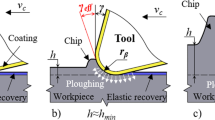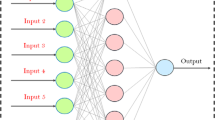Abstract
Grinding is a precision machining process widely used for close tolerance and good surface finish. Due to aggregate of geometrically undefined cutting edges and material removal in the form of microchips, grinding requires more specific energy as friction is greater in the grinding interface. The optimum use and proper penetration of coolant is the prime requirement which is achieved by effective cooling and lubrication. In this research, a greater focus is on MQL technique, which is economical and eco-friendly. The paper presents important aspects of the grinding process considering the surface roughness and cutting force. The experiments were carried out on horizontal surface grinding machine using Response surface methodology (RSM). In addition, evaluation of grinding performance parameters like coefficient of friction, cutting forces, temperature and specific grinding energy for different machining environments has been discussed. The lowest surface roughness and coefficient of friction observed was 0.1236 μm and 0.3906, respectively for MQL grinding, whereas lowest specific grinding energy was found as 18.95 N/mm2 in wet grinding. The temperature recorded in MQL grinding was 29.07 °C, which is marginally higher than wet condition. The response obtained as cutting forces, temperature and surface roughness under MQL mode encourages its use for machining AISI D3 type material compared to other grinding environments. Mathematical modeling showing the relation between the factors and response variables was established using Response surface methodology. Regression analysis was performed to determine the accuracy of mathematical model, significant factors and interaction effects of parameters on responses.
Similar content being viewed by others
References
D. Setti, M. K. Sinha, S. Ghosh and P. V. Rao, Performance evaluation of Ti-6Al-4V grinding using chip formation and coefficient of friction under the influence of nanofluids, International J. of Machine Tools and Manufacture, 88 (2015) 237–248.
P. H. Lee, S. W. Lee, S. H. Lim, S. H. Lee, H. S. Ko and S. W. Shin, A study on thermal characteristics of micro-scale grinding process using nanofluid minimum quantity lubrication (MQL), International J. of Precision Engineering and Manufacturing, 16 (9) (2015) 1899–1909.
D. Zhang, C. Li, D. Jia, Y. Zhang and X. Zhang, Specific grinding energy and surface roughness of nanoparticle jet minimum quantity lubrication in grinding, Chinese J. of Aeronautics, 28 (2) (2015) 570–581.
M. Sarikaya and A. Gullu, Multi-response optimization of minimum quantity lubrication parameters using Taguchibased grey relational analysis in turning of difficult-to-cut alloy Haynes 25, J. of Cleaner Production, 91 (2015) 347–357.
M. S. Najiha, M. M. Rahman and A. R. Yusoff, Environmental impacts and hazards associated with metal working fluids and recent advances in the sustainable systems: A re-view, J. of Renewable and Sustainable Energy Reviews, 60 (2016) 1008–1031.
K. Nadolny, M. Wojtewicz, W. Sienicki and D. Herman, An analysis of centrifugal MQL supply system potential in the internal cylindrical grinding process, ACME, 257 (2015) 1–11.
J. Sieniawski and K. Nadolny, Experimental study into the grinding force in surface grinding of steel CrV12 utilizing a zonal centrifugal coolant provision system, Proc. IMechE Part B: J. of Engineering Manufacture (2016) 1–10.
M. Hadad, An experimental investigation of the effects of machining parameters on environmentally friendly grinding process, J. of Cleaner Production, 108 (2015) 217–231.
N. R. Dhar, M. Hossain and M. Kamruzzaman, MQL applications in grinding of 16MnCr5 steel: A comparison with wet and dry grinding, Proc. of the International Conference on Mechanical Engineering, AM-33, Dhaka, Bangladesh (2005) 1–5.
M. A. Islam and N. R. Dhar, Effects of minimum quantity lubrication by vegetable oil based cutting fluid on temperature; chip morphology and surface finish in grinding AISI 1060 steel, Proc. of the 4th BSME-ASME International Conference on Thermal Engineering, Dhaka, Bangladesh (2008) 861–866.
M. H. Sadeghi, M. J. Haddad, T. Tawakoli and M. Emami, Minimal quantity lubrication-MQL in grinding of Ti-6Al-4V titanium alloy, International J. Advanced Manufacturing Technology, 44 (2009) 487–500.
C. Mao, X. Tang, H. Zou, Z. Zhou and W. Yin, Experimental investigation of surface quality for minimum quantity oilwater lubrication grinding, International J. of Advanced Manufacturing Technology, 59 (2012) 93–100.
A. Goyal, S. Dhiman, S. Kumar and R. Sharma, A study of experimental temperature measuring techniques used in metal cutting, Jourdan J. of Mechanical and Industrial Engineering, 8 (2) (2014) 82–93.
C. Mao, H. Zou, X. Huang, J. Zhang and Z. Zhou, The influence of spraying parameters on grinding performance for nanofluid minimum quantity lubrication, International J. of Advanced Manufacturing Technology (2012) Doi 10.1007/s00170-012-4143-y.
T. Tawakoli, M. J. Hadad and M. H. Sadeghi, Influence of oil mist parameters on minimum quantity lubrication-MQL grinding process, International J. of Machine Tools & Manufacture, 50 (2010) 521–531.
J. S. Nam, D. H. Kim, H. Chung and S. W. Lee, Optimization of environmentally benign micro-drilling process with nanofluid minimum quantity lubrication using response surface methodology and genetic algorithm, J. of Cleaner Production, 102 (2015) 428–436.
R. W. Maruda, G. M. Krolczyk, E. Feldshtein, F. Pusavec, M. Szydlowski, S. Legutko and A. S. Kupiec, A study on droplets sizes, their distribution and heat exchange for minimum quantity cooling lubrication (MQCL), International J. of Machine Tools & Manufacture, 100 (2016) 81–92.
M. Hadad and A. Sharbati, Thermal aspects of environmentally friendly-MQL grinding process, Procedia CIRP, 40 (2016) 509–515.
K. Li, F. Aghazadeh, S. Hatipkarasulu and T. G. Ray, Health risks from exposure to metal-working fluids in machining and grinding operations, International J. of Occupational Safety and Ergonomics, 9 (1) (2003) 75–95.
N. Boubekri and V. Shaikh, Minimum quantity lubrication (MQL) in machining: Benefits and drawbacks, J. of Industrial and Intelligent Information, 3 (3) (2015) 205–209.
J. S. Nam, D. H. Kim, H. Chung and S. W. Lee, Optimization of environmentally benign micro-drilling process with nanofluid minimum quantity lubrication using response surface methodology and genetic algorithm, J. of Cleaner Production, 102 (2015) 428–436.
R. S. Pawade and S. S. Joshi, Multi-objective optimization of surface roughness and cutting forces in high-speed turning of Inconel 718 using Taguchi grey relational analysis (TGRA), International J. of Advanced Manufacturing Technology (2011) Doi: 10.1007/s00170-011-3183-z.
T. Tawakoli, M. J. Hadad, M. H. Sadeghi, A. Daneshi, S. Stockert and A. Rasifard, An experimental investigation of the effects of workpiece and grinding parameters on minimum quantity lubrication-MQL grinding, International J. of Machine Tools & Manufacture, 49 (2009) 924–932.
M. Janardhan, An integrated evaluation approach for modeling and optimization of surface grinding process parameters, J. of Materials Today: Proceedings, 2 (2015) 1622–1633.
H. Demir, A. Gullu, I. Ciftci and U. Seker, An investigation into the influences of grain size and grinding parameters on surface roughness and grinding forces when grinding, J. of Mechanical Engineering, 56 (7-8) (2010) 447–454.
R. A. Irani, R. J. Bauer and A. Warkentin, A review of cutting fluid application in the grinding process, International J. of Machine Tools & Manufacture, 45 (2005) 1696–1705.
M. K. Gupta, P. K. Sood and V. S. Sharma, Machining parameters optimization of Titanium alloy using response surface methodology and particle swarm optimization under minimum quantity lubrication environment, Materials and Manufacturing Processes, 31 (2016) 1671–1682.
K. Krishnaiah and P. Shahabudeen, Applied design of experiments and Taguchi methods, PHI (2013).
D. C. Montgomery, Design and analysis of experiments, A Wiley Publication (2013).
Author information
Authors and Affiliations
Corresponding author
Additional information
Recommended by Associate Editor Young Whan Park
Rahul R. Chakule is currently a Ph.D. scholar in Mechanical Engineering at Rastrasant Tukdoji Maharaj Nagpur University. He received his master degree in Mechanical Engineering in 2006 from Sant Gadgebaba Amravati University, India. He is working as Assistant Professor in Mechanical Engineering at Savitribai Phule Pune University. His research interests are in manufacturing engineering, optimization techniques and application of nanofluid for machining process.
Sharad S. Chaudhari received his Ph.D. in Mechanical Engineering from Rastrasant Tukdoji Maharaj Nagpur University in 2011. He is currently a Professor of Mechanical Engineering at RTM Nagpur University, India. His research interests are in minimum quantity lubrication, agricultural and engineering research, study of industrial hazard, study of foundry issues and modernization.
P. S. Talmale obtained her master degree in Mechanical Engineering in 2012 from Sant Gadgebaba Amravati University, India. She is currently an Assistant Professor in Mechanical Engineering at Savitribai Phule Pune University. Her research interests are in computer aided design and manufacturing, product design and development, manufacturing science.
Rights and permissions
About this article
Cite this article
Chakule, R.R., Chaudhari, S.S. & Talmale, P.S. Evaluation of the effects of machining parameters on MQL based surface grinding process using response surface methodology. J Mech Sci Technol 31, 3907–3916 (2017). https://doi.org/10.1007/s12206-017-0736-6
Received:
Revised:
Accepted:
Published:
Issue Date:
DOI: https://doi.org/10.1007/s12206-017-0736-6




